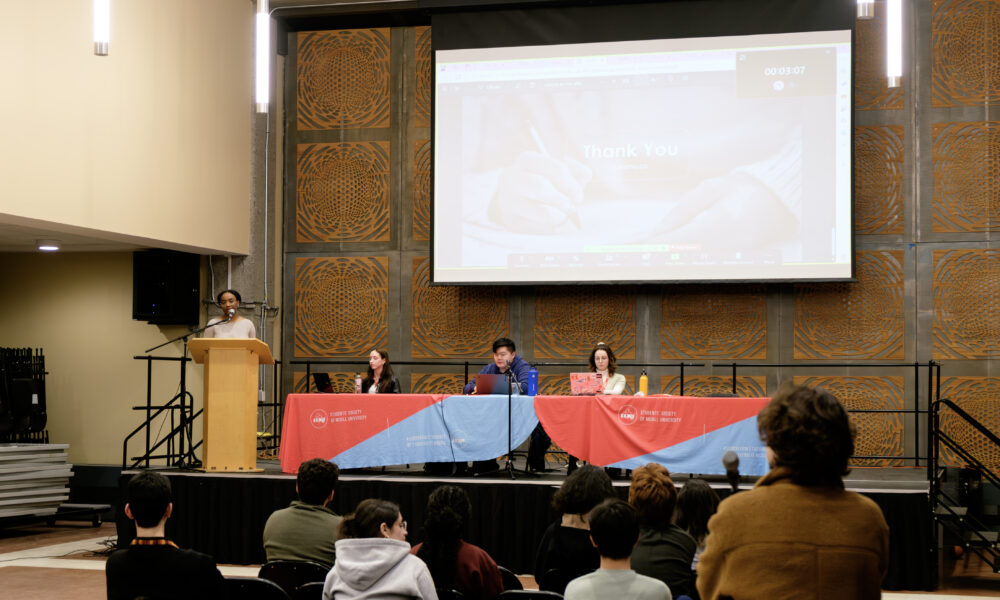The Students’ Society of McGill University (SSMU) held its biannual General Assembly (GA) in the University Centre Ballroom on Monday, Feb. 5. Around 25 people attended, meaning the meeting failed to meet a quorum of 350. This rendered the meeting merely a consultative forum; votes on motions were thus non-binding.
SSMU vice presidents (VPs) highlighted their work from the past semester, including the creation of a Senate ad-hoc committee on preferred names, support for progressive activism, the popularity of Gerts Café, and activities night, which, according to VP Student Life Nadia Dakdouki, attracted about 2,200 participants. Deficit spending and bureaucratic inefficiency are key issues facing SSMU. According to VP Finance Amina Kudrati-Plummer, its budget deficit for 2023-24 is over $726,000, nearly $500,000 less than the anticipated deficit.
President Alexandre Ashkir explained that he was trying to tackle bureaucratic inefficiency through his work this semester. Many committees have overlapping functions with similar or identical lines in their mandates. One such line is to “confront historical inequities at the university.” This line appears in the mandate of the Equity Committee, the Gender and Sexuality Advocacy Committee, and the Black Affairs Committee. According to Ashkir, this redundancy means that social justice efforts are spread out instead of being concentrated and effective. Ashkir believes that, as a result, “not much gets done” in confronting historical inequities. Along with reforming SSMU governance and committees, Ashkir wants to increase transparency and accountability to boost democratic participation in SSMU.
“The Accountability Committee has not been functional for the past many years. This, of course, causes a lack of accountability,” Ashkir said.
Tuition hikes were the first item on the docket after the reports from SSMU officers. Several students expressed frustration at SSMU for a lack of transparency and support for the strikes protesting tuition hikes. VP External Liam Gaither defended SSMU, arguing that it has encouraged student associations to strike.
“It is true that there hasn’t been a lot of transparency around it. But our initial tactic was to just speak directly with association executives who have […] the power to call those general assemblies [….] A couple of days of strik[ing] is not much more than like a symbolic measure, it’s kind of a drop in the bucket. But the idea is to build towards a broader mobilization of (a) more students and (b) for a longer time,” Gaither said.
SSMU’s Legislative Council recently passed a motion to make a special committee to explore the possibility of legal action against the tuition hikes.
The Tribune spoke to attendees after the meeting about the tuition hikes and student strikes. Alejandro Gonzalez, U1 Arts, expressed sympathy for SSMU.
“SSMU’s doing all it can. I think it’s mostly up to the students now to rise up,” Gonzalez said.
After the discussion on tuition hikes, SSMU Athletics Councillor Melanie Renaud, U3 Arts, raised the issue of the moratorium on ancillary fees, which is preventing McGill’s athletics and recreation facilities from accessing funding. In 2019, the Legislative Council passed a motion submitted by Divest McGill to freeze ancillary fees until the McGill administration divested from fossil fuel companies, which it has promised to do by 2025. This moratorium is up for renewal in May. Renaud argued that the moratorium blocked fees necessary for McGill Athletics and Recreation to serve students. SSMU views the moratorium as a means of pressuring the administration to divest.
Moment of the meeting: VP Sustainability and Operations Hassanatou Koulibaly presented minicourses offered by SSMU, including birdwatching, twerking, tarot card reading, and podcasting.
Soundbite: “COVID led to significant, significant surpluses [….] We used that additional COVID surplus to add new staff [and] new long-term operations, and we didn’t have the money to back that up [….] so we’re now in a significant deficit.” — VP Finance, Amina Kudrati-Plummer







